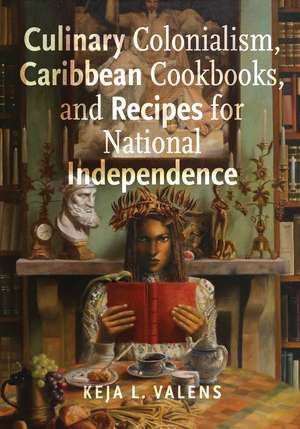Culinary Colonialism, Caribbean Cookbooks, and Recipes for National Independence: Critical Caribbean Studies
Autor Keja L. Valensen Limba Engleză Paperback – 16 feb 2024
Din seria Critical Caribbean Studies
-
 Preț: 144.11 lei
Preț: 144.11 lei -
 Preț: 264.15 lei
Preț: 264.15 lei -
 Preț: 185.09 lei
Preț: 185.09 lei -
 Preț: 334.71 lei
Preț: 334.71 lei -
 Preț: 243.85 lei
Preț: 243.85 lei -
 Preț: 245.95 lei
Preț: 245.95 lei -
 Preț: 258.06 lei
Preț: 258.06 lei -
 Preț: 283.83 lei
Preț: 283.83 lei -
 Preț: 211.03 lei
Preț: 211.03 lei -
 Preț: 314.72 lei
Preț: 314.72 lei -
 Preț: 346.99 lei
Preț: 346.99 lei -
 Preț: 262.40 lei
Preț: 262.40 lei -
 Preț: 316.46 lei
Preț: 316.46 lei -
 Preț: 366.31 lei
Preț: 366.31 lei -
 Preț: 361.12 lei
Preț: 361.12 lei -
 Preț: 370.28 lei
Preț: 370.28 lei -
 Preț: 360.14 lei
Preț: 360.14 lei - 23%
 Preț: 778.68 lei
Preț: 778.68 lei -
 Preț: 177.11 lei
Preț: 177.11 lei -
 Preț: 359.13 lei
Preț: 359.13 lei - 23%
 Preț: 779.75 lei
Preț: 779.75 lei -
 Preț: 251.36 lei
Preț: 251.36 lei -
 Preț: 218.16 lei
Preț: 218.16 lei - 10%
 Preț: 910.98 lei
Preț: 910.98 lei - 10%
 Preț: 910.98 lei
Preț: 910.98 lei - 10%
 Preț: 910.98 lei
Preț: 910.98 lei -
 Preț: 267.04 lei
Preț: 267.04 lei -
 Preț: 360.09 lei
Preț: 360.09 lei -
 Preț: 323.83 lei
Preț: 323.83 lei - 10%
 Preț: 910.98 lei
Preț: 910.98 lei -
 Preț: 359.04 lei
Preț: 359.04 lei - 51%
 Preț: 498.27 lei
Preț: 498.27 lei -
 Preț: 405.13 lei
Preț: 405.13 lei
Preț: 301.96 lei
Nou
Puncte Express: 453
Preț estimativ în valută:
57.79€ • 59.70$ • 48.09£
57.79€ • 59.70$ • 48.09£
Carte disponibilă
Livrare economică 04-18 martie
Livrare express 15-21 februarie pentru 54.30 lei
Preluare comenzi: 021 569.72.76
Specificații
ISBN-13: 9781978829541
ISBN-10: 197882954X
Pagini: 504
Ilustrații: 18 B-W illustrations
Dimensiuni: 178 x 254 x 33 mm
Greutate: 0.52 kg
Editura: Rutgers University Press
Colecția Rutgers University Press
Seria Critical Caribbean Studies
ISBN-10: 197882954X
Pagini: 504
Ilustrații: 18 B-W illustrations
Dimensiuni: 178 x 254 x 33 mm
Greutate: 0.52 kg
Editura: Rutgers University Press
Colecția Rutgers University Press
Seria Critical Caribbean Studies
Notă biografică
KEJA VALENS is a professor of English at Salem State University. She has published numerous works on Caribbean literature, women’s history, sexuality and diasporic identity, including the books Desire between Women in Caribbean Literature and Querying Consent: Beyond Permission and Refusal.
Cuprins
Preface: Whose Caribbean Cookbooks?
Introduction: Reading Caribbean Cookbooks
1 Nineteenth-Century Cocineros of Cuba and Puerto Rico
2 Domestic Control in West Indian Women’s Cookbooks at the Turn of the Twentieth Century
3 Colonial and Neocolonial Fortification in the French Antilles, Puerto Rico, and the U.S. Virgin Islands
4 Cuban Independence, to Taste
5 Dominican and Haitian (Re)Emergence
6 National Culture Cook-Up and Food Independence in Jamaica and Barbados
Conclusion
Acknowledgments
Notes
References
Index
Introduction: Reading Caribbean Cookbooks
1 Nineteenth-Century Cocineros of Cuba and Puerto Rico
2 Domestic Control in West Indian Women’s Cookbooks at the Turn of the Twentieth Century
3 Colonial and Neocolonial Fortification in the French Antilles, Puerto Rico, and the U.S. Virgin Islands
4 Cuban Independence, to Taste
5 Dominican and Haitian (Re)Emergence
6 National Culture Cook-Up and Food Independence in Jamaica and Barbados
Conclusion
Acknowledgments
Notes
References
Index
Recenzii
"Drawing on a fascinating range of Caribbean texts and case studies, Culinary Colonialism shows how cookbooks have historically been at the heart of projects such as women’s organization, nation building and decolonization in the region. Valens' global focus and her interdisciplinary approach in this book provide new and exciting insights into how more recent Caribbean cookbooks continue to 'migrate and circulate' through the Caribbean diaspora and to intersect with twenty-first century issues such as geopolitics, climate disaster, and new media. Combining recipes and scholarly analysis, this is a book for all those interested in the Caribbean, in Food Studies and in the burgeoning study of the intersections between the two."
"A fascinating exploration of Caribbean creolization, anti-colonialism, and nationhood through the stories and concoctions of women who write and cook: 'kitchen poets,' Barbadian American novelist Paule Marshall would have called them."
"The most extensive study of Caribbean cookbooks to date. . . . With accurate references and detailed notes providing rich genealogical and historical context, the book also includes recipes from the cookbooks, allowing readers to engage more deeply with the research and practically prepare Caribbean dishes."
"A fascinating exploration of Caribbean creolization, anti-colonialism, and nationhood through the stories and concoctions of women who write and cook: 'kitchen poets,' Barbadian American novelist Paule Marshall would have called them."
"The most extensive study of Caribbean cookbooks to date. . . . With accurate references and detailed notes providing rich genealogical and historical context, the book also includes recipes from the cookbooks, allowing readers to engage more deeply with the research and practically prepare Caribbean dishes."
Descriere
Culinary Colonialism is the first book-length analysis of Caribbean cookbooks, tracing the multitude of ways they represent national identity, creolization, and working-class women’s food culture. Including full recipes from Cuban, Puerto Rican, Jamaican, Barbadian, Haitian, Dominican, and Antillean cookbooks, this groundbreaking work of scholarship doubles as a delicious cookbook.
